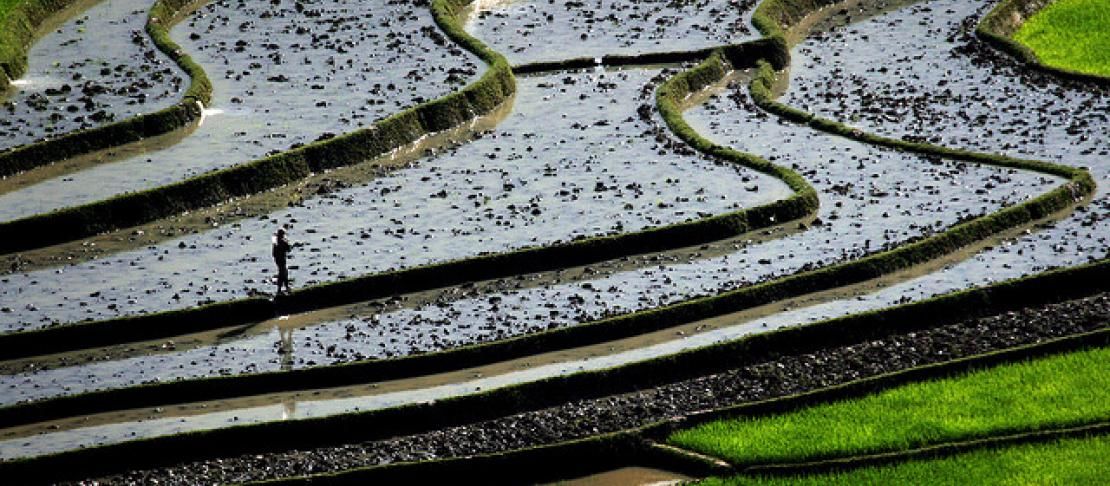IFPRI Landscape Approach to Climate Change Mitigation in Agriculture (LACCMA)

Project description
To guide large-scale investment and policy planning in land-based climate change mitigation research, better information is needed about how the inter-relationships among landscape features, socio-ecological conditions, external interventions, and local institutions influence mitigation outcomes. The Landscape approach to decreasing agricultural emissions in Vietnam (LACCMA) project analyzes features of an optimal landscape for low emissions development in Vietnam and measures the economic costs and benefits that would act as catalysts or constraints. It also considers exogenous forces such as economic and climatic changes.
Project staff and stakeholders together identify constraints, incentives, and components of Vietnamese landscapes that sustainably deliver multiple services. They develop pathways that lead to a food secure, low-emissions future. These pathways are analyzed for ability to meet food-crop production targets and increase production systems’ resilience in the wider context of landscapes. The project examines how men and women are likely to differentially use and value different landscape elements and services in an effort to ensure that both men’s and women’s values, perspectives, and knowledge are included in the models and decision-making processes. For example, initial gender research informed models that include potential differentiation of economic returns and potential for adoption across genders. LACCMA also structures results to include the concerns of other marginalized groups (youth, certain ethnic groups, landless).
Achieving Vietnam’s mitigation plans, including the 20/20/20 Plan and the Green Growth Plan, requires overcoming several challenges, including: perceived shortage of paddy land, dwindling water resources due to poor land use management and soil degradation, and encroachment of cultivation on to forest land.
LACCMA provides technical assistance to the government to address these challenges; promotes a collaborative process that builds on existing experiences of multi-stakeholder platforms and networks of partners and collaborators; and facilitates implementation of mitigation plans by identifying economically viable landscape development pathways.
Project partners have strong connections with NGOs (OXFAM, SNV and CODESPA) that emphasize gender. Their leading roles in stakeholder engagement and governance structure analysis will help embed gender-equitable processes for model building and in institutional arrangements that will carry forward landscape-level approaches.
In 2015, the project created a modeling framework that analyzes, quantifies, and evaluates adoption of climate-smart practices at landscape scale and provides ex-ante comparisons of locally optimized climate-smart trajectories with production and land-use outcomes determined by global and external forces. Furthermore, the project mapped and engaged with governance structures, institutions, and collective-actions groups capable of facilitating the adoption of climate-smart agriculture at landscape scale.
- Climate-smart landscapes. Can mitigation potential be unleashed by taking a broader approach?
- Climate-smart landscapes and stakeholders' preferences. Accounting for differences in priorities to achieve a sustainable adoption of CSA practices.
- Engaging multiple stakeholders for the development of climate smart landscapes. Methods and lessons learned.
- Identifying strategies for implementation of viable low-carbon landscape development in Vietnam
- Developing climate smart landscapes through stakeholder engagement.
- Opportunities for increasing resilience in climate change mitigation practices. Working cooperatively across landscapes.
The International Food Policy Research Institute (IFPRI) is leading the project and partnering in Vietnam with the National Institute of Agricultural Planning and Projection, the Institute for Agricultural Environment, and EcoAgriculture Partners. The project has cooperative relationships with the provincial ministries of the Ministry of Agriculture and Rural Development and the Ministry of Natural Resources and Environment, district people’s committees, the Unions of Women, Farmers and Youth; participating NGOs (including OXFAM, SNV and CODESPA); and agribusinesses that are seeking to reduce commodity sourcing risks and increase supply chain sustainability.
For further information please contact project leader, Alex de Pinto (IFPRI), a.depinto@cgiar.org.